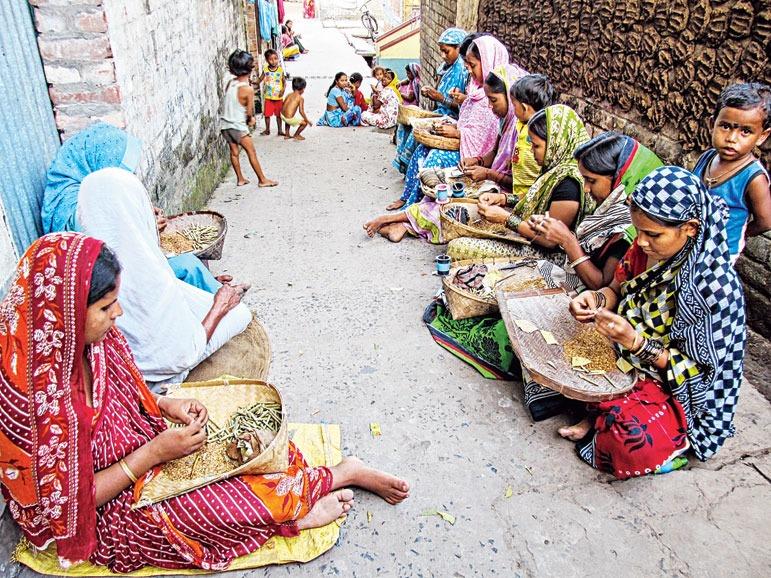Bengal's Bidi Workers Struggle With Poverty While Companies Reap Huge Profit

Kolkata/Murshidabad: Rulekha Bibi (35), mother of five and a bidi worker from Jarda village of Suti II police station area of Murshidabad district in West Bengal, is unable to afford her household expenses. “We are exploited day in and day out,” she said while speaking to NewsClick.
For binding 1000 bidis in a day, she is supposed to get Rs 178, but the Munshi or the middleman takes two handfuls of bidis as 'Patti' -- a prevalent system of bribe taken by the Munshi (middleman) in the industry.
Bibi works for Pataka Bidi, a leading manufacturer of the good in the state, and gets work three days a week. The Kendu leaves, with which bidis are tied, are made available to her only thrice a week. The company and the Munshi resort to unfair practices by giving them less leaves than needed to tie 1000 bidis, according to Bibi. The company’s leaves only suffice for 900 bidis and the rest we have to buy from the open market; it is a similar case for threads that are given to the workers in small quantities, she claimed.
"These practices effectively bring down our wage to Rs 130 for binding 1000 bidis. In one day, a bidi binder is generally able to bind about 900 to 1000 pieces after 12 hours of strenuous work, which requires hand skills and good eyesight," she said.
A bidi packet consisting of 20 bidis is sold for Rs 12 in the market, pegging the price of 1000 bidis at Rs 600 even by the lowest estimates.
The practice of 'Patti' is not standardised in Murshidabad, where about 17 lakh bidi workers live and work.
Interestingly, according to the 2011 Census, the total number of inhabitants of the district is 71.04 lakhs, of which 17 lakh male and female population is related to the bidi trade. Most of the owners of the bidi companies are millionaires and directly related to the ruling party as MP and MLA. The local MP is also a Bidi company owner as is the MLA. Even the Zilla chairperson of Murshidabad district is the owner of a bidi-manufacturing unit.
Amongst the bidi manufacturers, Pataka Bidi is the largest one, with a huge mansion as its head office in Kolkata and its products are even exported to the Gulf countries.
Ignored by Govt, Exploited by Employers
Shirin Khatun(28), the divorced mother of a girl child, stays with her mother in a dilapidated house in Shamsergung of Murshidabad district. Her seven-year-old kid sometimes helps her work. Khatun's mother, who is nearly 60 years old, is also a bidi worker. The mother-daughter duo can bind about 1,500 bidis after working for nearly 17 hours and earns about Rs 6500 per month, with which three family members are supported. "Though her father has thrown her away, as her mother, I cannot do that," Khatun says, talking about her daughter. "I am trying to give my daughter education by enrolling her in the local government primary school," she told NewsClick.
She further complained, "We are unable to live; even the government has not provided us with money from the Indira Awas Yojana to rebuild our house though others in the locality have got that."
Khatun and her mother do not have a Provident Fund account. Of the 17 lakh bidi workers in Murshidabad, only three lakhs have Provident Fund registration in their names and the rest are left in the lurch.
"Even if I have a high fever or am extremely unwell, I still have to carry on with the work of bidi binding seven days a week with whatever leaves we can manage from the company," she said. Khatun binds bidi for a contractor of Noor company, whose owner Khalilur Rahman is the local MP of the Jangipur Loksabha segment.
Rjia Bibi (56) has been in the trade for more than 43 years. A resident of Suti II police station area, she still does not have a provident fund account and her effective wage is Rs 125. According to her, she has to give four handfuls of Patti to the Munshi of Pataka Bidi, which makes her lose around 100 bidis after binding 1,000.
“We are exploited to the core and I manage about Rs 4,500 per month, We have nine members in my household, My daughter-in-law and daughters also bind bidi, but our joint income does not cross 10,000 a month, with which we have to buy our food items, arrange for fuel and our medical expenses. Rijia is also suffering from high asthma after inhaling bidi dust for a prolonged period of time.
MD Azad, a bidi worker who is also the president of the All India Bidi Workers Federation (AIBWF) - Murshidabad unit, said that the exploitation of workers by the bidi manufacturers is coupled with the apathetic attitude of the central and the state government, which adds to the problems of the bidi workers in the state. As most bidi company owners are leaders of the locally ruling Trinamool Congress, the state government, where the same party is in power, always sides with the owners, he said.
The government also has a long history of dilly-dallying when it comes to signing the wage agreements in the sector as, by government rules, the minimum wage should be Rs 276, Azad added.
In the Murshidabad district, the minimum wage has been fixed at Rs 178. However, the bribes such as Patti and the practice of giving less leaves to the bidi workers for binding bring the actual wage down to the Rs 130 to Rs 140 level. "We are fighting against these, but the state government is maintaining a stoic silence over this issue," Azad said while speaking to NewsClick.
"In the last few years, the central government has collected Rs 1,164 crores as cess from the bidi manufacturing companies, but the privileges that we were supposed to get from the cess amount are slowly being withdrawn," the AIBWF president said. As per the social security network of the bidi workers, they are supposed to get an allowance for entertainment like going to sea sides, house building, scholarships, and medical treatment. "Except for the scholarship, and to some extent, the medical allowances, all the other schemes have been withdrawn by the central government even though it gets crores of rupees as cess every year from the sector," he said in disdain.
There are ten big hospitals in the country for treating bidi workers, of which the biggest is located at Tarapur of Murshidabad district. However, the hospital does not have adequate facilities for treatment and even ECG and USG machines are not active for want of technicians. There is also not a sufficient amount of doctors and nurses in the hospital, which is located on 70 bighas of land at Tarapur in the Dhulian block of Murshidabad. Many of the 292 welfare dispensaries the country has are situated in Murshidabad but lack medicine stocks.
Under these circumstances, the West Bengal unit of the AIBWF held their 10th Conference at Baishnabnagar of Maldaha district. It adopted a proposal for 'Raj Bhavan Abhijan' in Kolkata on July 5 with the demands of Rs 178 as minimum wage in all the districts of the state and revitalising the social security network for bidi workers.
Apart from the outgoing AIBWF state secretary Debasish Roy, who is also the general secretary of the Federation, Kinkar Poshak, vice president of AIBWF, and Anadi Sahoo, general secretary of CITU West Bengal Committee, put garlands at the martyrs' column at the start of the conference. The conference was addressed by Sahoo, who in his speech took a potshot at the central government for trying to enforce the four labour codes across the country.
The leaders in the open rally noted that though the government fixed the minimum wage at Rs 276, still the bidi company owners are dilly-dallying with the union even to give RS 178 as minimum wage in the state, and these have to stop.
Get the latest reports & analysis with people's perspective on Protests, movements & deep analytical videos, discussions of the current affairs in your Telegram app. Subscribe to NewsClick's Telegram channel & get Real-Time updates on stories, as they get published on our website.
























